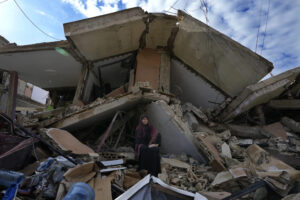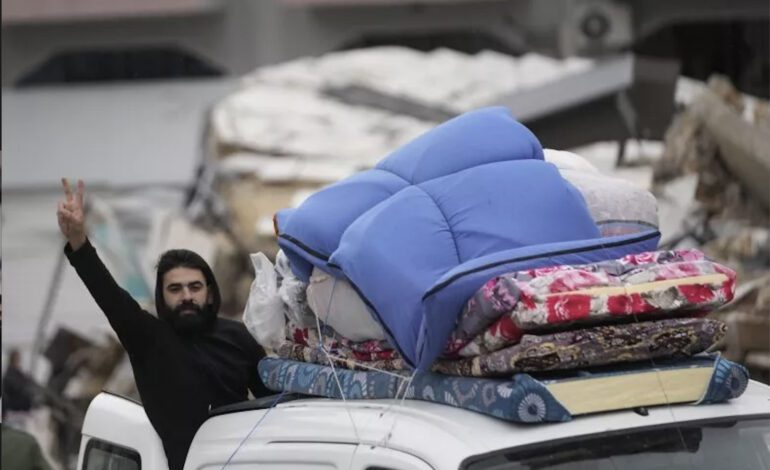On Wednesday, tens of thousands of displaced Lebanese residents began returning to their homes in Southern Lebanon as a ceasefire was called, halting the fighting between Israel and Lebanese group Hezbollah. After a nearly 14 month cross-border fight and Israel’s invasion into Lebanon last month, with thousands killed, displaced and wounded, the U.S. and France have brokered a ceasefire deal.
Pictures and videos of the scenes in Lebanon show flags being swung, citizens cheering, cars of people filling the roads as they return to the south and celebratory sights, despite Israeli military warnings advising they wait until their forces leave before returning to the area.
The ceasefire began at 4 a.m. Wednesday morning and requires Israeli troops to “gradually withdraw” from Southern Lebanon over the next two months and Hezbollah to relinquish its forces in the region as well, according to the Associated Press. The Lebanese Army will deploy to the territory to preserve safety and uphold the ceasefire agreement. Israel said that it will attack if Hezbollah counters against the truce.
Lebanese Parliament Speaker Nabih Berri told all of the displaced to return to their homes.
“Come back to your land,” he said in a televised speech on Wednesday. “Your land will be stronger with your presence. You should come back. You should protect the land that saw the blood of all the martyrs.
“Come back to your land and bring back life to all the neighborhoods that the Israeli occupation and aggression tried to destroy,” he added. “The victory of your land relies on you coming back.”
Lebanese Prime Minister Nab Makati said this was the “most cruel phase in Lebanese history”, affirming the Lebanese army’s deployment in the south in order to preserve security as well as emphasizing Israel’s exit in the region.

Residents celebrate, carrying Hezbollah flags in Beirut, Lebanon. A ceasefire has been implemented between Israel and the Hezbollah group.

Mariam Kourani, 56, sits on the rubble of her destroyed house after she returned with her family to the Hanouiyeh village in southern Lebanon, Thursday, November 28. – AP.

A displaced resident reacts as he returns to his village following the ceasefire between Israel and Hezbollah. Residents are returning to the south. – Photo by AP
Iran welcomes Lebanon ceasefire, reserves right to react to Israeli airstrikes
On Wednesday, Iranian Foreign Minister Abbas Araqchi said that Tehran reserves the right to react to Israeli airstrikes on Iran last month, but is also taking account of other developments in the region.
Netanyahu: Israel has told ICC it will contest arrest warrants
Meanwhile, on Wednesday, Israel has informed the International Criminal Court that it will contest arrest warrants for Netanyahu and former Defense Minister Yoav Gallant over their conduct of the Gaza war, Netanyahu’s office said.
No expectations of a swift deal for Gaza after Lebanon ceasefire
Following a deal to end more than a year of fighting between Israel and Lebanon’s Hezbollah, attention has swung back to the battered Gaza Strip, but any hopes of a rapid end to the war there look likely to be dashed.

The 13-point document calls for Israel to withdraw its forces from southern Lebanon, enabling civilians on both sides of the border to return to their homes.
On Wednesday, a ceasefire between Israel and the powerful Lebanese movement Hezbollah took effect after both sides accepted an agreement brokered by the United States and France.
The agreement, which comprises 13 points, involves Israel withdrawing from southern Lebanon, which will enable civilians on both sides of the border to return to their homes.
Over the next 60 days, Hezbollah will remove its fighters and weapons from the area between the Blue Line — the unofficial border between Lebanon and Israel — to areas north of the Litani River.
In the south, Hezbollah fighters will be replaced with the Lebanese army, which will ensure that infrastructure and weaponry are removed and cannot be rebuilt.
Here is the full text of the agreement:
Announcement of a Cessation of Hostilities and Related Commitments on Enhanced Security Arrangements and Towards the Implementation of UNSCR 1701
After discussions with the governments of the republic of Lebanon (hereinafter “Lebanon”) and the state of Israel (hereinafter “Israel”), the United States of America and France understand that Lebanon and Israel seek a sustainable end to the current escalation of hostilities across the Blue Line and are each prepared to take steps to promote conditions for a permanent and comprehensive solution. These understandings reflect steps to which Israel and Lebanon are committed in order to implement fully U.N. Security Council Resolution (UNSCR) 1701, recognizing that UNSCR 1701 also calls for full implementation of its predecessor UNSC resolutions, including “disarmament of all armed groups in Lebanon”, so that the only forces authorized to carry arms in Lebanon will be the Lebanese Armed Forces (LAF), Internal Security Forces, Directorate of General Security, General Directorate of State Security, Lebanese Customs and Municipal Police (hereinafter “Lebanon’s official military and security forces”). To that end, the U.S. and France understand the following
1. Israel and Lebanon will implement a cessation of hostilities beginning at 4am, November 27, 2024 in accordance with the commitments detailed below.
2. From 4 a.m, November 27, 2024 forward, the government of Lebanon will prevent Hezbollah and all other armed groups in the territory of Lebanon from carrying out any operations against Israel, and Israel will not carry out any offensive military operations against Lebanese targets, including civilian, military or other state targets, in the territory of Lebanon by land, air or sea.
3. Israel and Lebanon recognize the importance of UNSCR 1701 to achieving lasting peace and security and commit to taking steps towards its full implementation, without violation.
4. These commitments do not preclude either Israel or Lebanon from exercising their inherent right of self-defense, consistent with international law.
5. Without prejudice to the U.N. Interim Force in Lebanon (UNIFIL) and its responsibilities, or to commitments in UNSCR 1701 and its predecessor resolutions, Lebanon’s official military and security forces, infrastructure and weaponry will be the only armed groups, arms and related materiel deployed in the southern Litani area shown in the attached LAF Deployment Plan (hereinafter “the Southern Litani Area”).
6. Consistent with UNSCR 1701 and its predecessor resolutions, in order to prevent the re-establishment and rearmament of non-state armed groups in Lebanon, any sales or supply of arms and related materiel into Lebanon will be regulated and controlled by the government of Lebanon. Additionally, all production of arms and related materiel within Lebanon will be regulated and controlled by the government of Lebanon.
7. In order to implement UNSCR 1701, and upon the commencement of the cessation of hostilities according to paragraph one, the government of Lebanon will provide all necessary authorities, including freedom of movement, to Lebanon’s official military and security forces, and instruct them, consistent with UNSCR 1701 and its predecessor resolutions to:
a. Monitor and enforce against any unauthorized entry of arms and related materiel into and throughout Lebanon, including through all border crossings, and against the unauthorized production of arms and materiel within Lebanon.
b. Starting with the Southern Litani Area, dismantle all existing unauthorized facilities involved in the production of arms and related materiel, and prevent the establishment of such facilities in the future.
c. Starting with the Southern Litani Area, dismantle all infrastructure and military positions, and confiscate all unauthorized arms inconsistent with these commitments.
8. The U.S. and France intend to work within the Military Technical Committee for Lebanon (MTC4L) to enable and achieve a total LAF deployment of 10,000 soldiers to southern Lebanon as soon as possible. Further, the U.S. and France intend to work with the international community to support the LAF as appropriate to achieve such an increase in its deployment levels in Lebanon, and to improve its capabilities.
9. Upon the commencement of the cessation of hostilities according to paragraph one, and without prejudice to UNIFIL and its mandate and responsibilities in UNSCR 1701 and its predecessor resolutions, Israel and Lebanon resolve, in co-ordination with UNIFIL, to reformulate and enhance the tripartite mechanism (hereinafter: “the Mechanism”). The reformulated and enhanced Mechanism, hosted by UNIFIL, chaired by the U.S., and including France, will monitor, verify, and assist in ensuring enforcement of these commitments.
a. Israel and Lebanon will co-operate with and facilitate the work of the Mechanism and will ensure their safety.
b. The Mechanism will work with the MTC4L to strengthen the capacity and training of the LAF to inspect and dismantle unauthorized sites and infrastructure, above and below ground, confiscate unauthorized weapons, and prevent the presence of unauthorized armed groups.
c. Alongside the Mechanism’s work, UNIFIL’s work pursuant to its mandate will continue, including the efforts UNIFIL supports through its convening role that enhance the Mechanism’s effectiveness.
10. Israel and Lebanon will report any alleged violations to the Mechanism and UNIFIL without prejudice to their respective rights to communicate directly with the U.N. Security Council. The Mechanism will develop appropriate procedures to consult, inspect, gather information, and assist in ensuring the enforcement of these commitments.
11. Upon the commencement of the cessation of hostilities according to paragraph one, Lebanon will deploy its official military and security forces to all borders, and to all regulated and non-regulated land, air and sea border crossings. In addition, the LAF will deploy forces, set road blocks and checkpoints on all the roads and bridges along the line delineating the Southern Litani Area.
12. Upon the commencement of the cessation of hostilities according to paragraph one, Israel will withdraw its forces in a phased manner south of the Blue Line, and in parallel the LAF will deploy to positions in the Southern Litani Area shown in the attached LAF Deployment Plan, and will commence the implementation of its obligations under the commitments, including the dismantling of unauthorized sites and infrastructure and confiscating unauthorized arms and related materiel. The Mechanism will co-ordinate execution by the Israel Defense Forces and LAF of the specific and detailed plan for the phased withdrawal and deployment in these areas, which should not exceed 60 days.
13. Israel and Lebanon request that the U.S. – with the partnership of the U.N. – facilitate indirect negotiations between Israel and Lebanon with the objective of resolving remaining disputed points along the Blue Line, consistent with resolution 1701.
The U.S. and France understand that the above commitments will be accepted by Israel and Lebanon concurrently with this announcement.
These commitments strive to enable civilians on both sides of the Blue Line to return safely to their lands and homes. The U.S. and France further intend to lead international efforts to support capacity-building and economic development throughout Lebanon to advance stability and prosperity in this region.






Leave a Reply